When the UN's World Water Day talks focused on taking control of water resources, some understandably got concerned… They did get it right however, that creative ways should be developed to extend water financing and expand water portfolios! And you'll see just what we had to say about it from last week's media appearances and our World Water Day panel discussion. So where does that put Water On Demand™ on the solution adoption curve? Find out in the replay!
Transcript from recording
Opening
Estrella: Why should people invest in Water On Demand?
Riggs: This is a new concept that has gotten tremendous support from higher end investors. Amazing. I can't believe how great these people are. They've been true loyalists to the Nth Degree. But now as we expand, we don't want to get a bunch more high end investors. We want to get a lot of small investors. It's healthier.
For example, political campaigns that use a lot of small donations do better than the ones that use a few billionaires because it's more of a movement. We want to create a movement.
So, number one, it has that capability of creating a movement. Number two, now is when we're building these pilot systems and when we build the pilot systems, we get recognition from Wall Street to raise money from investment banks. We can do that, too, but we need to have those working systems and now is when we're doing it, right?
Also, we want to start making acquisitions, acquiring other companies to make our job easier and we want to build a team that is going to manage all that. It's a lot to do and it's better to have, you know, a thousand people with a small amount than 100 people with a large amount. It's just healthier.
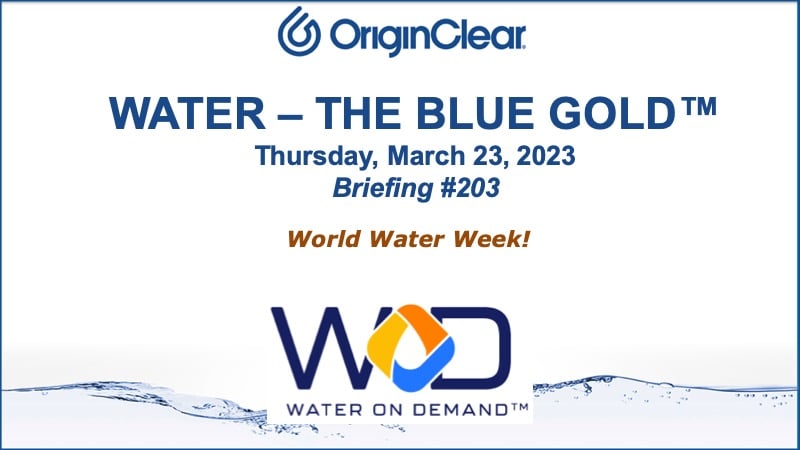
And welcome everyone to the day after World Water Day. Ken and I came back from our meetings and events. Estrella is still in New York taking more meetings. All right. Briefing number 203 and it is World Water Week. Lots of events at the UN this week. We had our own events. I'm going to go over that in detail.
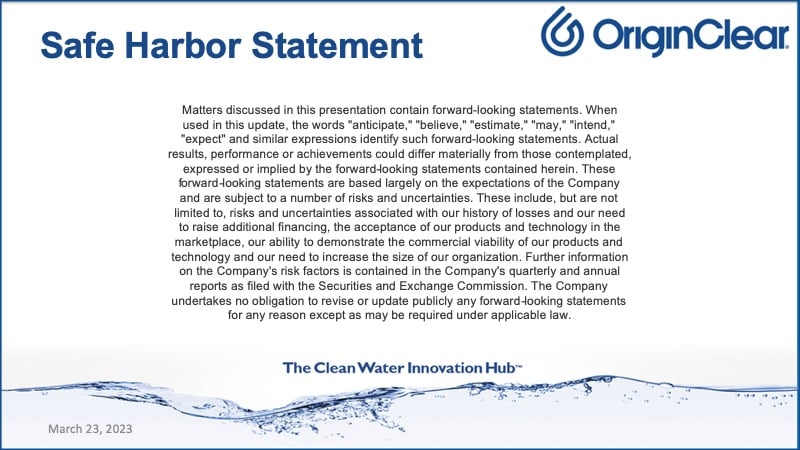
The usual disclaimers.
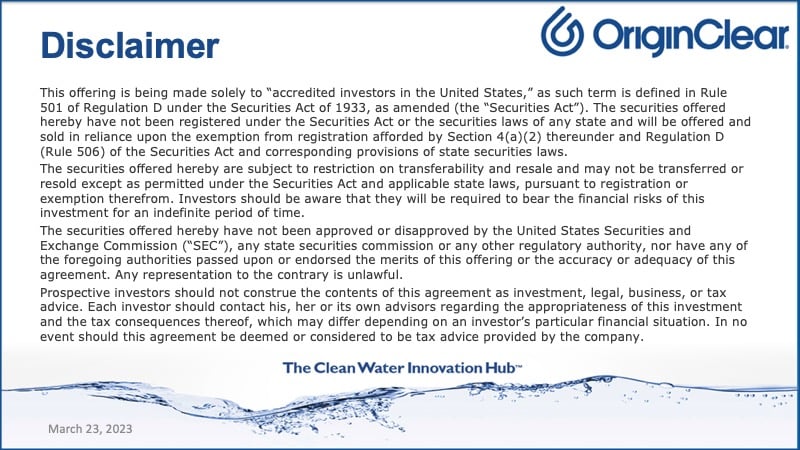
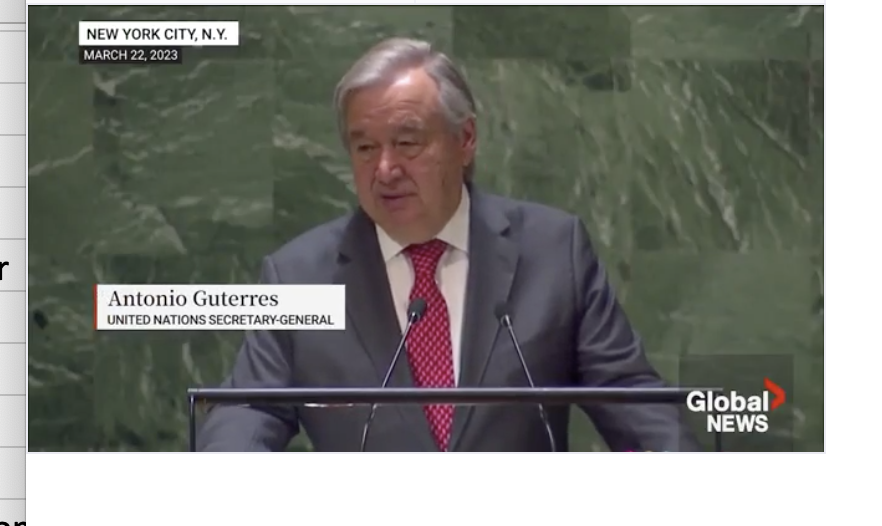
Here is the UN chief talking about water scarcity and what we can do about it and what are the solutions. And I think you'll find that this is very familiar. Here we go.
Start of presentation
Antonio G: Water is humanity's lifeblood from the food we eat to the ecosystems and biodiversity that enrich our world, to the prosperity that sustains nations, to the economic engines of agriculture, manufacturing and energy generation, to our health, hygiene and survival itself. Water is a human right, and the common development denominator to shape a better future.
But water is in deep trouble. We are draining humanity's lifeblood through vampiric overconsumption and unsustainable use and evaporating it through global heating. We've broken the water cycle, destroyed ecosystems and contaminated groundwater. Nearly three out of four natural disasters are linked to water. 1 in 4 people lives without safely managed water services or clean drinking water. And over 1.7 billion people lack basic sanitation.
Excellencies, Dear friends. This is more than a conference on water. It is a conference on today's world. Since from the perspective of its most important resource, this conference must represent a quantum leap in the capacity of Member States and the international community to recognize and act upon the vital importance of water to our world sustainability and as a tool to foster peace and international cooperation.
From water as a key driver across economies and policy making to the recognition of water and sanitation as a human right. From the integration of water and climate policies to an innovative approach in the use of water in food production, now is the moment for game changing commitments to bring the water action agenda to life.
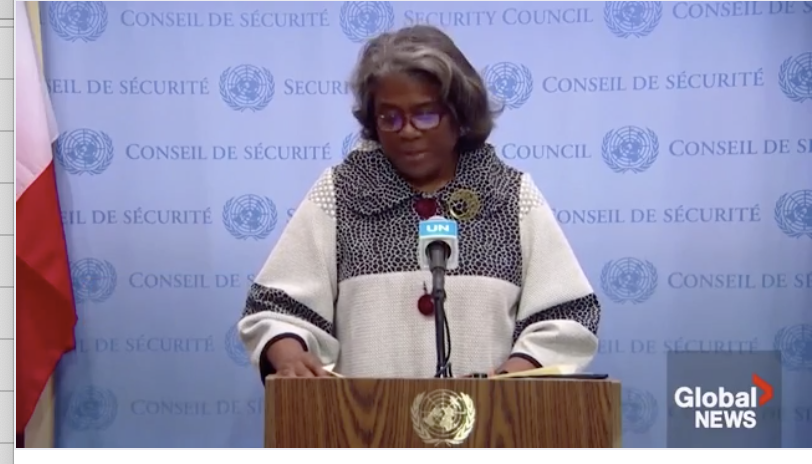
Linda T-G: A 2022 study by the University of California, Los Angeles estimated that almost half of the world's population will suffer severe water stress by 2030. This is a crisis, one that affects people around the globe and one that demands concrete action. That's why I am proud to announce that the United States is committing $49 billion toward equitable, climate resilient, water and sanitation investments at home and around the globe.
That significant number should demonstrate just how seriously we take water security. These investments will help to create jobs, prevent conflict, safeguard public health, reduce the risk of famine and hunger, and enable us to respond to climate change and natural disasters. This announcement builds on the first ever White House Action Plan on global water security, an innovative and unified approach that brings together US diplomatic and development tools, as well as science and technology to respond to water security around the world.
But let's be clear. The global crisis requires global cooperation. The Security Council must take up the issue of water scarcity, especially because we know that water scarcity exacerbates conflict and disrupts peace and security. Without water, there cannot be food. There cannot be peace. There cannot be life. We must build a future where safe water flows freely to all. Thank you very much.

Pope Francis: Hodges celebration at the Mondial de la Cour de la Parola di San Francesco D'assisi. My praise to Signore Passalacqua. Water is very precious. The cost is simple. It is a beauty of creation. Awareness of its value implies we take care. In Germany and in New York, La Segunda Conferencia de la Organizacion de la Nazioni Unite Pro Perelman de Lavori is taking place. The important event supports the initiative in favor of the many who suffer from shortages.
End of presentation
Riggs: Well, this is all very good. Obviously, there's the devil's in the details, but certainly there's a lot of awareness of water problems. And the thing is that government, including the UN, is going to take steps to remedy the problem. But it's, we've made it clear it's a gigantic problem. $49 billion doesn't even come close to resolving it and it's a drop of water.
So we're just not going to be able to handle it that way. It's good. What's being done is good. But Paul Fetcher wants to know, "Did you give the pontiff stock options?" Very cute. Very cute. Anyway, so with that, we're going to move right along here.
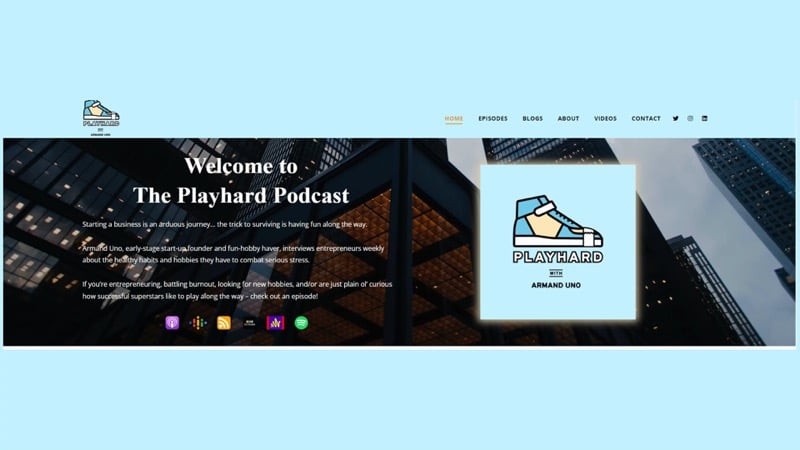
This is a podcast that was done that had some really good content in it and appearance. So here's part one. Let's jump right into it.
Start of presentation
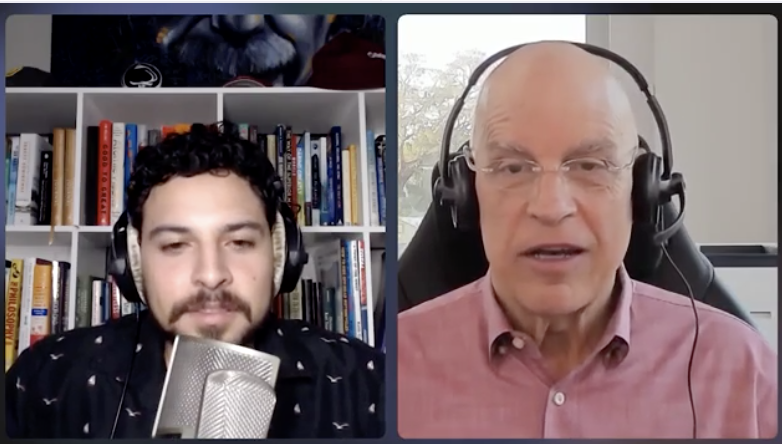
Armond: Try the CEO and one of the founders of OriginClear. Did I read correctly that you co-founded this with your brother?
Riggs: Correct. But way back in the day. In fact, it was called OriginOil, because our mission in the early days was to turn algae, microalgae, into biofuels and which was so much fun and I was on all the mainstream media. But then fracking came in and dropped the price of crude way below $50. At that point, it was like a science experiment and we had to figure out what we were going to do instead. Fortunately, our technology could be repurposed to clean water.
So we did a pivot and we ended up in the water industry, which was fascinating because, you know, water is largely a government monopoly, but it's underserved. It's way underfunded. Since 1961, we've accumulated a $1 trillion unmet deficit of infrastructure and no one's going to write that check any time soon. And so, we stepped into a space that was invisible to the public because governmental but also badly underserved.
And with all these problems cropping up, you know, like Flint, Michigan, like Compton, California, Jackson, Mississippi, and nobody knowing what to really do about it. I literally talked to a friend who was in the Mississippi House of Representatives in Jackson, Mississippi, saying, "Hey, there's a problem with the water." And he says, "Oh, that's the city, that's not me." So literally, there is this sort of hands off view. And and so there's a solution. I can talk about it. But the point is, is we stepped into a world that was had very little awareness and yet is crucial to our health and existence.
Armond: Yeah, I saw someone who was kind of mentioning a post the other day that you could go, you know, the classic saying 2 to 3 weeks without food, but only three days without water. It makes up most of who we are. And it's so not just for like... It's what, it keeps you healthy. Like, the more water you drink, the better you feel throughout the day, your energy levels. So how is it that such a, you know, essential aspect to being human, water, is so, kind of like, almost turned a blind eye? It seems like no one's taking responsibility for this kind of issue. Like how is the how did the infrastructure get this bad?
Riggs: That's a very good point. We had, of course, a boom in building water systems in the 19th century, the wonderful New York the Delaware distribution system, which is amazing to this day, and then into the 20th century. Right? Right into World War Two. You know, like, for example, look at Hoover Dam. Right? That was a huge project. But what it took was, you know, they were okay with the occasional worker falling in the concrete and dying and being buried with the concrete. You could never do that today.
And so in a way, I don't know if you've been in Los Angeles Armond, but there is all these huge concrete rivers that today we would never build those. It's not it's not the way. And so there's an antiquated way of building giant public works systems.
Armond: Yeah.
Riggs: That is not feasible today. And so what happened is we didn't realize it. And so starting in the 60's the impetus to build more of these and to keep doing more just wasn't there. I don't think that politicians respond to what people's concerns are. And if people aren't screaming about water, the politicians will do something else. So the, for example, the Biden administration did this huge infrastructure bill a couple of years ago, $1.2 trillion. The water part of it was 55 billion, which is less than one year's unmet budget for the infrastructure. But we funded rural broadband, you know.
Armond: Yeah.
Riggs: I think, I think what is more important than rural broadband, as important as rural broadband is, you know, I think that water is more vital to life. Now we're seeing what's going on in East Palestine, Ohio, which is affecting the entire Ohio River watershed.
Armond: That's right, yeah.
Riggs: That's a big deal. One of my execs is based outside of Pittsburgh and he's literally two counties away from a county that is seeing dying wildlife..
Armond: Yeah, wow.
Riggs: It brings it home. It's horrendous, right?
Armond: I'm, just to to let you know, I am located in San Diego so I know exactly what you're talking about in LA. It's, yeah I know what you're talking because you see videos like where people skateboarding and stuff there now, like that's what it's for. It's not really. Well, lately we've been getting a lot of rain, so I'm guessing it's going to be a little a little more useful.
Riggs: They were built to get the water as fast as possible into the ocean. Wait, hold your horses. We need that water. The Army Corps of Engineers, their job was, "Okay a floods going to come along. We got to channel it. We got to get it to the ocean." And it does a fine job of that. And you're right, those rivers are actually full for once. I'm seeing videos of like literally storm tossed river.
But, here's the thing. And in fact, there was a LA River project that was started by the, by Mayor Garcetti to change the river to an absorption model so that it recharges the groundwater. And that is the smart way to go. The problem is, is that the infrastructure is old, America's infrastructure is generally treat it and dispose of it, treat it and dispose of it, whether it's the floodwaters going into the ocean or the sewage being treated and put in the ocean. That's the model.
But we have to reuse the water. We have to save the water. We're draining our aquifers and it takes hundreds of years to recharge an aquifer once it's once it gets depleted. The estimate for the Ogallala Aquifer, for example, in the Midwest, which is being depleted, is that once it's depleted, it takes 600 years to recharge it and you can't just pump. It has to happen on a sort of seepage basis.
So what we have to move to is a new model. Now, here's the good news. Remember how in Africa they bypassed the whole land lines thing and they went straight to cell phones, which is current technology. Meanwhile, America was stuck with its landline stuff and cell phone adoption was slower as a result.
Well. We get it. We have a chance to leapfrog to this new model, which is very light and adaptable and localized and very heavy on the reuse. And as a result, we will have the number one infrastructure in the world and it will not take $1 trillion. That's the vision. And it's in part because the government monopoly is breaking up and is being commercialized. You know, when AT&T got broken up, it turned into eventually what became the Internet. It was huge. And I think the same thing will happen with water.
Armond: And what is OriginClear's kind of, piece in this puzzle, for solving that problem?
Riggs: So OriginClear, I came out of high tech and one of the things we have in high tech is these incubators. Y Combinator, IdeaLab, Bill Gross, IdeaLab in Pasadena for many years was a great model. They don't exist in water. In water, you build a mom and pop water company and then you, when you just time to retire, you sell it to the big guys and that's it.
But the problem there is that there's a lot of water technology that is not finding funding because that's not a mom and pop model. When you, technology is not built on the mom and pop basis, it's built on a more of a VC model and it just doesn't exist in water.
So we decided we would be the first water incubator, and that's what we are. And we have created our first child, so to speak, which is this amazing thing called Water On Demand. And here's what we realized. There's two things. Let's just fast forward to what the solution is to our infrastructure problem. It's not going to be building billion dollar central systems. Not going to happen.
Even if you had the money. Where are you going to locate it? I'm in Pinellas County in Florida, and it's full of houses and no one wants a sewage plant next to their home. So, it's not going to happen. The solution then is to co-locate the water treatment at the businesses that are making the water dirty, right? And in fact...
Armond: That makes sense.
Riggs: Right? 90% of all freshwater demand is by industry and agriculture. So if we unburden the system and have them do the heavy lifting of their own water, there's two benefits. Number one, it unburdens the central system. And that way humans, you and me, were the remaining 10%. We can get proper service from these cities and because right now they can't, they're being completely overloaded by all the industrial waste and agricultural waste.
Secondly, once these businesses do their own treatment, they can recycle themselves, they can reuse it. They have a they have an economic incentive to do so because they don't have to pay for the water again. And so now we start implementing recycling in this country for the first time, which also basically don't do it.
Armond: So it'll also be kind of like over time or in a way, if they're treating their own water, it'll turn it kind of cheaper almost.
Riggs: Exactly. So the businesses, when they hear that, that they can get off the municipality system and onto their own, they like it because, number one, they they don't get quite as much regulatory hassle.
Number two, they get a stable water rate. Water rates have been skyrocketing much faster than inflation in this country. So this way it locks in a certain inflation index on a long term contract.
Number three, they can recycle, therefore get more turns out of the water, which is financially good. And then we have a combination of, number one, the technology to downsize down to these businesses called Modular Water. And then we have the finance system to enable these businesses to continue paying on the meter and not have to come up with a million bucks that they don't have. And that's called Water On Demand.
Armond: Interesting. Yeah, It sounds like the, at the very least the fair thing to do, if 90% is, you know, businesses in agriculture are using this water and then they're not even taking care of their... Like, you know, you kind of seem like that, that would be the right thing to do. Why is it that we haven't moved towards that direction yet?
Riggs: I think, again, it's because of neglect. Our water systems were designed originally to serve humans in the early industrial days. It wasn't as intense as it is today, but now we have factory farming. So these intense factory operations, for example, in the Carolinas put out huge amounts of nitrates. And I'm a businessman. I'm going to do what the law requires me, and even then I'll try and get a lawyer to help me sort of put off the inevitable, right?
So you can't really blame corporations, but when you come up with a better idea for them, generally they go, "Oh, okay, that makes sense for my bottom line." And that's what we're finding. So we're finding, A. A lot of adoption for what I call radical decentralization. This is a new concept where we immediately get businesses off of the municipal system through this sort of drop in place technology. And then the other part of it is to help them financially, so not to buy the system, they just pay by the gallon, which they love as well. Those two things work in sync, in synergy to make it easy for the businesses to do it. And we've got more business than we can possibly handle. It's ridiculous.
Armond: That's good. Yeah, that's great to hear. So how did you get into this entrepreneurial journey in the first place? Like take a step back on the entrepreneurship story. I know you started before this, a cybersecurity company. I believe you were doing some other things too. So how did this kind of come about?
Riggs: I was raised as a corporate brat in various capitals of the world. My dad was a Procter and Gamble exec, and he'd sort of go to the next branch office kind of thing. And he was literally like Jon Hamm in Mad Men. He was that guy with all the pluses and minuses, really interesting guy. And and so he was very much like, you know, in the 50s and 60s in Europe, if you were an American with dollars, you were in good shape.
He could talk. He could meet and talk with anyone that he wanted to anywhere, really. He was top of the heap and he kind of communicated that point of view of like, "Hey, you have access, you can you can see and talk to anyone you want." Then, what I did was I actually got really excited about working in the nonprofit space. And so coming out of high school, I literally went straight into the nonprofit and learned a lot of great things. For example, I became a ship captain and had a whole side career on that. That was fascinating.
Armond: Adventure at Sea?
Riggs: Oh, it was amazing, the stories. We could do a whole other podcast on those stories. But, and but I also got a sense of doing, you know, not just doing a 9 to 5, doing something good for the world that, you know, I was being paid literally nothing, but I was having really a good time being focused on making things better in the world.
Well, eventually I wrapped that up in the early 80s and I started looking at what was transformational in a similar way out in the business world. And it was clear to me it was technology. That's it, right? I just don't think as an employee, right? So instead I just jumped straight into boiling water. And I started a company in Manhattan in the 80s, which was, I had a wonderful time. But it was, I was always undercapitalized.
And eventually I just, this is a really good learning experience for me that I've taken heart with, which is that I basically got discouraged and I gave the business to my best salesman and he's since become a millionaire with it. And I moved on, which from a financial point of view, I probably should have stuck with what I was doing.
But from a skills point of view, it got me eventually into the dotcom. I eventually ended up in LA in the early 90s and I was in on the early days of the dotcom and I had a blast. I loved the use, the use of computers moved from computing, which is what I was doing in the 80s with these business computer systems, to communication. And computers for communication of course blossomed. That's what you and I are doing right now, right?
And so that, I became passionate about it and had some good experiences. I had some liquidity events, as we call it, which was very nice. Got to the year 2000, helped a company called Yellowpages.com survive the year 2000 and get sold to a couple of Baby Bells. That was a win. And then I had a chance to I was busy, you know, all through this period, the 90s and the early 2000s going up the the corporate ladder.
And I finally got a chance to become a number two at a company that was aiming to get onto the Nasdaq. And in fact, we succeeded. We got the company on the Nasdaq and like all number twos, I thought I could be a better number one. And so, I called up a fund that I was working with, that I'd worked with before, and I said I'd like to be a CEO. And unfortunately, they agreed. And so they said, "Well, Riggs, we think you'd be a good CEO. But we're not doing tech anymore. We're doing green."
And this is 2007, which was the height of the green era when green was really big. And in fact, the administration at the time was working hard to keep the price of crude high to encourage renewables, which they eventually failed at, and eventually the price went down to market. They said, "We want to, we think algae has got a future. We want you to head it and go find a technology." And I said, "Well, guys, I've got a technology." Long story short, we launched and it's been 14 years of being a public company in these various iterations. And one thing I've learned is never get discouraged.
Armond: And how has that been, being a public company? Like how's the how's the whole journey? I don't know if I've talked to someone who's gone on that side. I've talked to a lot of startup entrepreneurs, a lot of people who've sold off, like sold their companies or been bought out. But I don't know if I've gotten the chance to have a conversation with someone who took it public.
Riggs: I like it a lot because you're only boss is the investing public. That's who your boss is, right? I mean, yeah, you're working for the board, but generally the board is, you know, if you're doing the right thing, they'll just go along with it. The investing public wants to know you're doing the right thing. And so that's really your boss.
I like it. I like relating. We have some amazing investors in OriginClear. They are super supportive. You know, we are working hard to, as I say, launch these companies into the stratosphere and they're on board with it. So yes, there are requirements. You have to be audited. You have to a lot of disclosure, but I've gotten used to that by now.
And everything I say now, you know, I don't say, you know, I will go to breakfast. I'll go, I am planning to go to breakfast because everything is plan, intend, expect. It's never a straight statement. It becomes part of your lingo, you know. But personally, I like it. The one issue is that over the 14 years I've been doing this, the over-the-counter market, the penny stock market has become more and more dysfunctional because there's been a lot of abuse.
And really the only game in town is to Uplist, to the Nasdaq or the New York Stock Exchange or some other large exchange like the German one or the Singaporean. There's a number of good exchanges out there because investors have more, institutional investors have confidence that if you've made the requirements of Nasdaq, then you're okay. You know you're investable.
If I had to do it again, I would do what's called a, there's a special kind of offering that came up in 2013, which is called Regulation A, unaccredited investors. And you can raise money through unaccredited investors and built into that regulation is you automatically become public. And if you do it right, you're public on the Nasdaq. So that's the new, new thing is to crowdfund your way to the Nasdaq. It's really, really interesting way to go. And in fact, we're just about to open a crowdfunding for our latest child, Water On Demand. And that is the secret sauce to get it on the Nasdaq.
Armond: Nice. Yeah. So you guys are like, don't get discouraged. You know, you're passing along your learnings to the companies you're working with and. I think that's great. Um, yeah. So I like how you said it's kind of like you're planning on going to breakfast. You're like, That's kind of how your days go. To go on the topic of routines and your habits, like what, I guess with you, like what is the ideal? Do you have a set routine or like what's your ideal morning look like versus how does it actually look like?
Riggs: Well, of course, long before COVID, I started operating from the Home Office and the main reason was I'd show up at the office and people would go, "Oh, hey, Riggs, hey Riggs." I get these people buttonholing me constantly. And in order to actually create hierarchy, I started operating from the home and it started working really well. And then of course, COVID accelerated all that.
I have a rhythm whereby I'm basically on duty all the time, but I take breaks. I make sure I work, also important. And I have a particular workout that I'm very unusual, but nonetheless, it works for me. And and then what I basically make sure, is that I'm, it's a high stress position. So how do you keep from being stressed? Well, like I say, you work out, but also you learn to do things that change the pace, right?
For example, I'll help my wife with her school or I'll work on a personal project. I continue to be involved with the nonprofit I was with way back in the day and I'll do projects with them. I continue to to learn. I try to study something important every single day. I try to pursue spiritual health. All these things are built in so that I can kind of roll with it and I can respond to something at 10 p.m. without being stressed about it.
And, you know, the people that who work for me, who are stressed, they go, Riggs, how do you do it? I'm like, "Well, it's basically, you know, you've just got to wave top, wave topping, boom, boom, boom, boom, boom, boom. Don't go into the trough. Right. Just stay on top of it.
And one thing I've learned, it's very easy to be the only responsible person in the room and everybody else, like week, week, week. He wants to be. You're the responsible one. Help us. You know Obi-Wan Kenobi. No, what you're trying to do, of course, is create an entourage of people who are as responsible as you. And it finally started happening. It took a couple a few years, actually.
But starting in 2018, I started getting really strong people around me that I don't have to go, "Hey, did you do this? Did you handle that?" I don't have to be the reminder service, which is really where that's the most wear and tear, is when you like go, "Oh cripes, I have to now write the personally write the copy for this whole website, Kill me now." Whereas now I've got some good content people and I'll just I'll work more on the, on the high level messaging and that's how it should be.
Armond: Something you want to convey versus the actual message itself.
Riggs: Yeah. Like, like what, what are we trying to, you know, what is the high concept, right? And I, as long as I don't have to go, you know, like literally write every word. Then I feel that my mental health is going to be okay because I'm being the communicator, my head is clear for it. But frequently my best work is done on the weekends and I'm okay with that. It's fine.
End of presentation
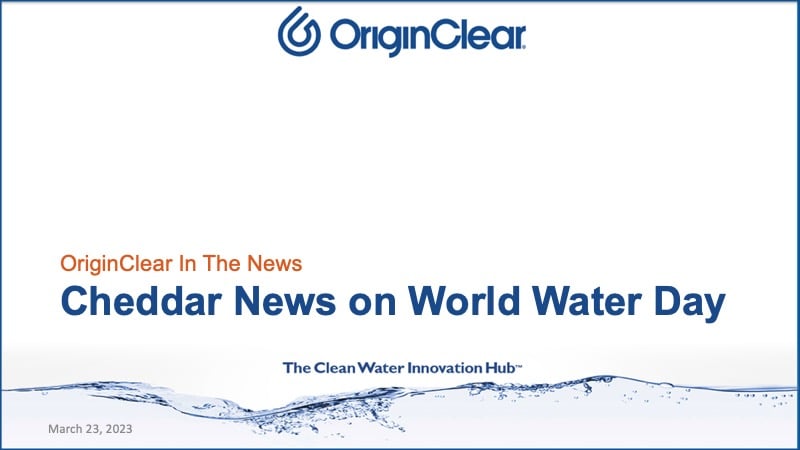
So that was a little bit of a personal story woven into our mission, what we're doing, and it's a fascinating podcast that was being done. So with that, I'm going to move on to something super cool. The morning of World Water Day I was on national TV, and the network is called Cheddar. Now, you may or may not have heard about Cheddar, but it is very, very involved with millennials. It gets millions of distribution and it's very involved with streaming.
Start of presentation
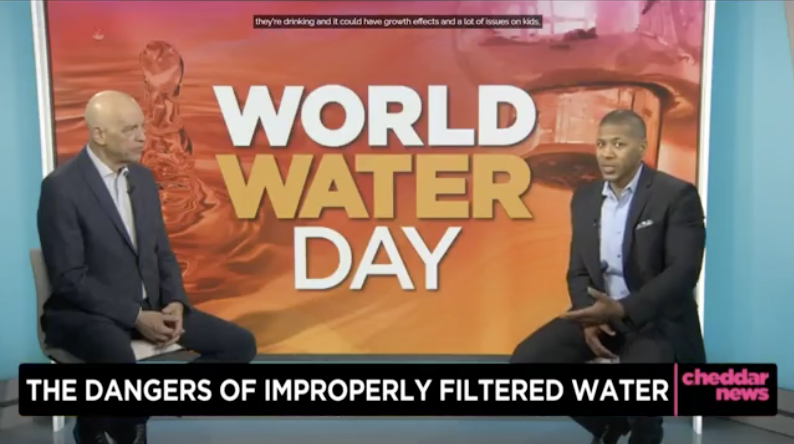
Commentator: Welcome back, everyone. Over 2 billion people worldwide don't have access to safe, clean water at home. Today is World Water Day dedicated to increasing access to clean water worldwide. And our very own Shannon Lanier is here to tell us more. Good morning, Shannon. Good morning.
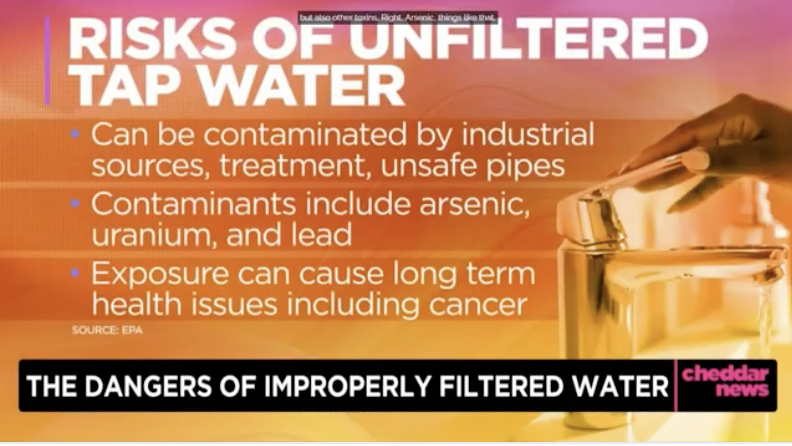
Shannon: Hi everyone. Yeah, you know, the importance of water can't be overstated. Yesterday's IPCC climate report said that there's actually a chance that half of the world's population could experience water scarcity for at least some of the year if climate change continues. And so I'm going to be bringing in Riggs Eckelberry, a national water expert and founder and CEO of OriginClear, and he's going to tell us a little bit more about why water safety is so important and why we're all affected by this issue.
So Riggs here in the US, you know, you've already experienced this and you've been researching and reading about this, that there have been water crises that we've experienced in Jackson, Mississippi, and Flint, Michigan, and probably other places that haven't even been publicized in the news. So when we say that some areas don't have access to clean and safe water, what does that mean exactly?
Riggs: Well, Shannon, our water network has been neglected since 1961. All right. So just like that old Toyota Corolla that you don't fix the radiator, you keep throwing water in it. It's how it's been. And so as a result, we have a degradation of the big central network. Now, this harms the least wealthy communities that are at the end of the line, which is why we hear about Flint and Jackson, Compton, California. These, it's no accident that these are poor communities, which is inherently unfair. Now, what's going on? Very simple lack of maintenance and combined with tremendous amount of business industry traffic is causing the consumer to be shortchanged.
Shannon: And even people that don't realize they're being exposed like some of the schools in our school system, they're older buildings. Some of the places where people work are older buildings as well. But how does the school specifically leave kids at risk when they have these issues in these older buildings?
Riggs: Well, pipes, old pipes have lead in them. And by now the problem is, we saw this in Flint where the because of serious mistakes made by the people trying to run it, they allowed lead into the pipes. And once it's in there, it doesn't come out. So what do you do about it? You got to do it, and we'll talk about this, at the point solutions, right there where you're drinking it, you got to fix it.
Shannon: Wow. Okay. So what are some of the effects of long exposure to unfiltered water or water with lead in it?
Riggs: Well, okay. So lead of course, any amount of lead, especially on a growing person, is has severe system, long term system problems for the individual. I'm not a doctor but you want to avoid all lead but also other toxins. Right. Arsenic, things like that. And then then there's these long term chemicals that are in the system.
Shannon: Yeah. And I know that's affecting a lot of people when they don't even realize they're drinking it. And it could have growth effects and a lot of issues on kids. So what are some of the areas that you see this happening? Is it just people's homes? Is it just where the places that are drinking? Because we see a lot of people trying to turn to water bottles as well.
Riggs: Okay. First of all, the water that we get from the city, typically whatever city is not going to kill us overnight, right? It's been sanitized. You're not going to get typhus or whatever. But there's these toxins in there. By now, there's no water in America. Possibly, New York's pretty good. But other than that, you got some pretty poor water and you're going to have to purify, to drink, but also to shower.
Shannon: Well, really, to shower too? Okay. So we're going to talk more about this. We're going to have you stick around because we're going to come back in the next half an hour and we're going to talk more about some of the solutions, what we can do to purify the water in our home, especially the drinking water. And now we've got to do the shower, too. So there's a lot to talk about. Riggs, please hang out with us. We appreciate you being here and helping everyone get a solution to this water crisis that a lot of people may not even know they're experiencing yet.
End of presentation
OriginClear in NY on World Water Day
Riggs: Well, and then it went on. There was a second segment which I don't happen to have here, which had got into specific solutions with Brita filters and the reverse osmosis and so forth, like what you saw the other week with Fox5 in Atlanta, got into the similar thing and I had a chance also to push the OriginClear mission, which was great.
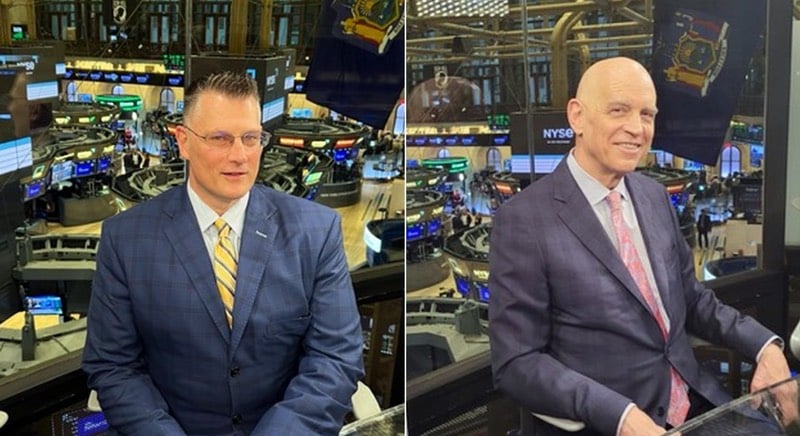
We took some pictures today. A lot of the video is going to be next week, but here is OriginClear in New York, World Water Day.
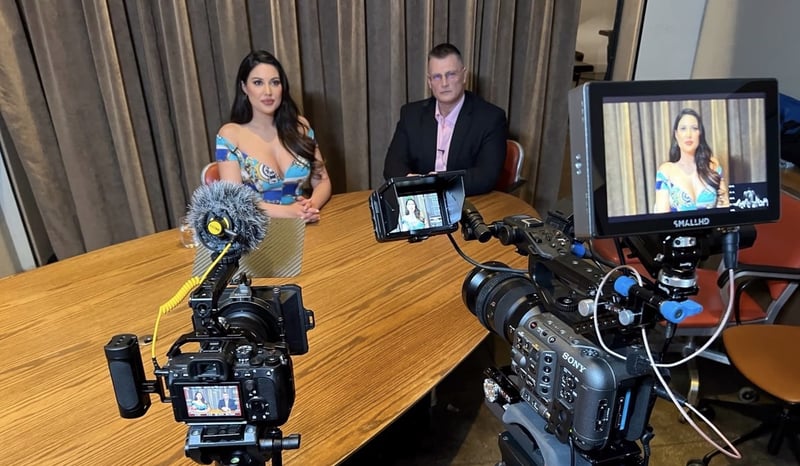
Here is Ken interviewing Estrella Nouri, who showed up at the Neuehouse event. And as you know, Estrella is our brand ambassador. She's compensated in cash and shares for promoting our crowdfunding and also the general OriginClear story. She's doing a wonderful job.
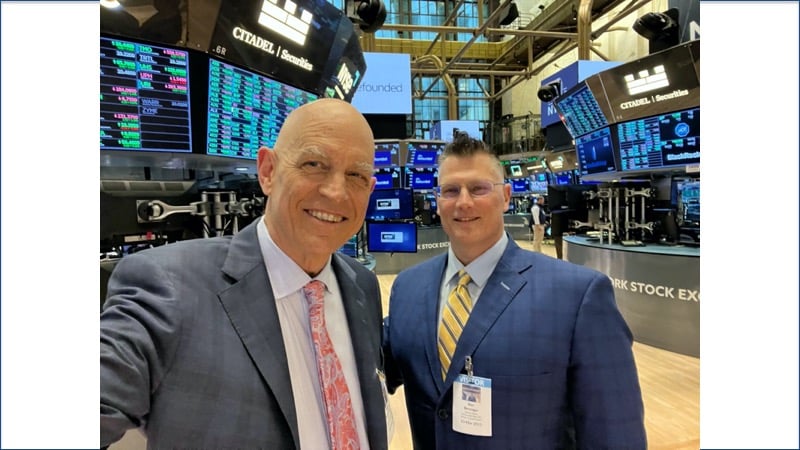
And here we are today, this morning at the New York Stock Exchange. Oh, yeah, baby. And these days, it's a very quiet place. It's all computers.
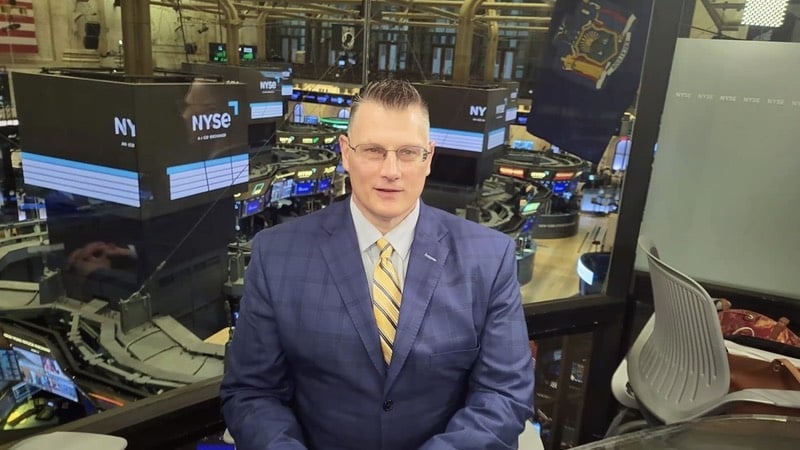
This is the hutch above the floor where they shoot these segments, which was what we did.
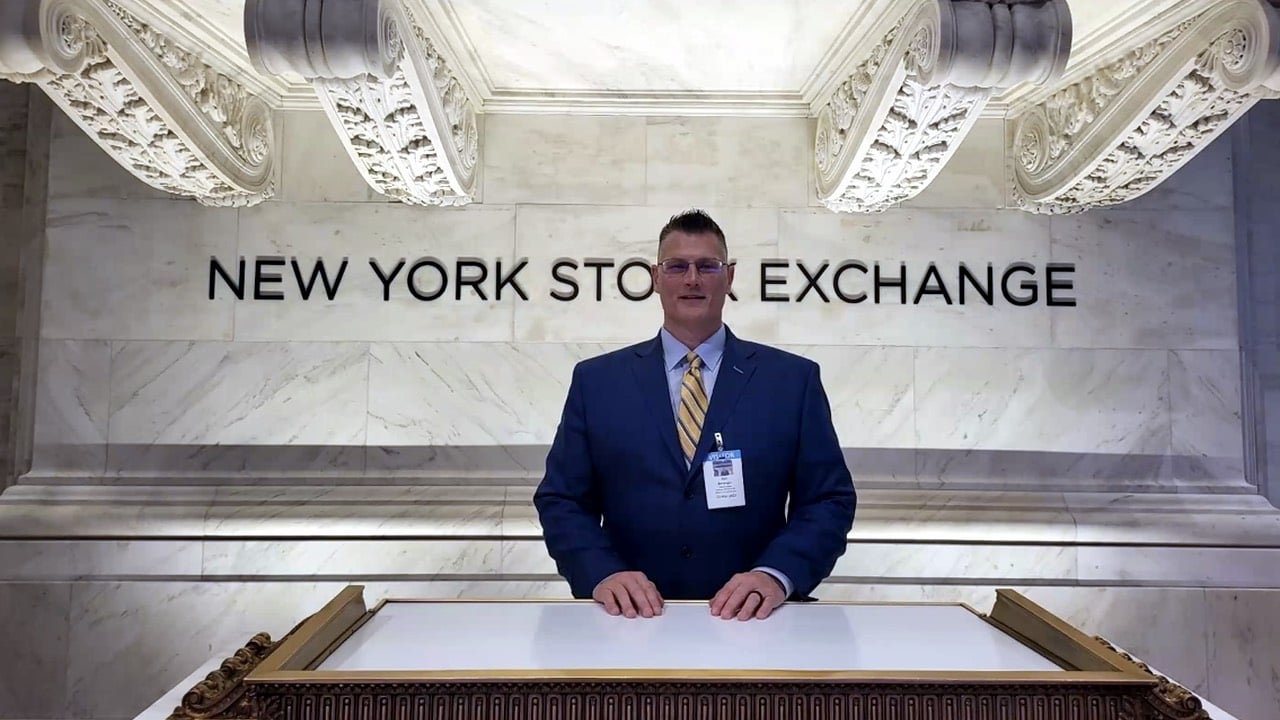
Ken, of course, is being king of the mountain here at the New York Stock Exchange.
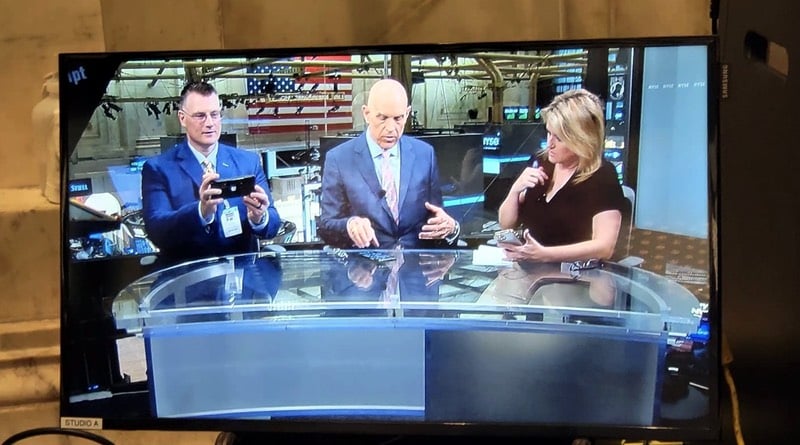
So both of us ended up talking to Jane King and that is going to be showing up on Newsmax. Bloomberg and Fox Business News. So lots of fun.
Freewheeling Discussion
And with that, I'm jumping into the free wheeling discussion.
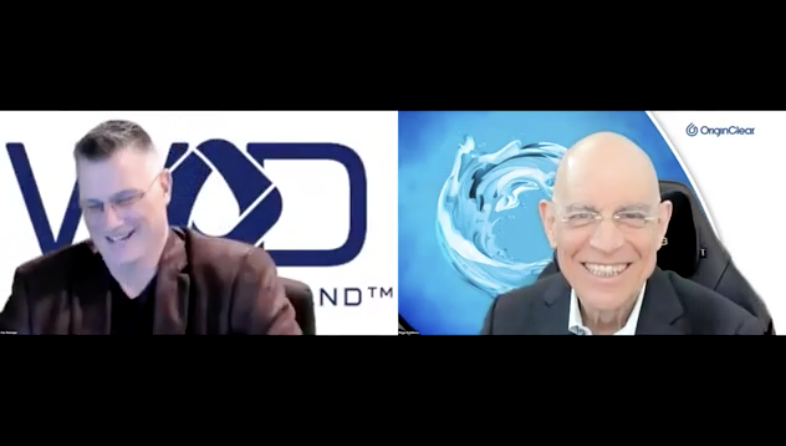
Ken: So that last one was me taking a picture of a picture, right? I was like, Oh, that's a cool shot. And the the Brita filter thing was Riggs and I were scouring a Duane Reade at 9:00 at night in Manhattan. That was another thing. He was asked to bring a filter at the last second. He had a, what was it, 6 a.m. He had to be there.
Riggs: Well, fortunately, it's 24/7, so.
Ken: And it's it's astonishing. It's right. You're like, oh, my God, that was yesterday. I know. It seems like a week ago. We packed a lot of stuff into the, you know, 24, 48 hour cycle. It was, it was pretty, well, first I will say that I was stricken by how insanely quiet it was on the floor of the exchange when my brother worked there. It was the guys yelling at each other and, you know, all that stuff. It's very sedate.
It is probably one of the most secure, this was like getting into CIA headquarters. It was, you know, that was, that was very, very much like the airport, really, right? But it's still, you know, there was billions of dollars of transactions going on as we just kind of sauntered through. So that was kind of neat.
It was, I found World Water Day in our discussions with bankers, you know, meeting with those Wall Street guys. I found that to be, first of all, I found them to be refreshing, very honest, very frank, very practical. Right. But there really wasn't any of them that didn't kind of get it and really like what we were doing. So that was also very, very encouraging.
Riggs: Yes. So we met with a lot of investment banks and fund managers and so forth and fixers. There's Estrella. Hey, you look.

Estrella: Hello.
Riggs: You look very demure.
Estrella: Thank you.
Riggs: It was so much fun. And we we had to admire your poise because literally in that whole group, there was you and one other woman. That was it.
Estrella: That is so true. But I loved being there and I loved adding to the energy. And it was such a great time.
Riggs: So good. So good. So the footage is going to come out from the, from yesterday. The video guys did a great job, from what I understand. And so that's going to be together. And then this morning, of course, and literally it was so squeezed in there, we were trying to get Estrella in there, but it was like, so here we are.
Ken: Trust me, Estrella. It wasn't going to happen. I mean, you know, it just... She was like, and she was interviewing us and she was like, So what's the size of the smallest one of these boxes? And I wanted to say, "Bigger than this room," in the interview. I held back. I held back. But the table, I mean, it's a great studio. It's, I mean, it's like this crow's nest perch. But it was really, between the camera equipment. It was literally the size of the table. Now you've got Riggs and I, you know, he's six five. I'm six three.
Estrella: Oh, we got, we got video proof. Love it. Or picture proof.
Ken: We were climbing, climbing through the chairs to try to sit down. It's very, very tight.
Estrella: Well, you know what? You ended up interviewing me, which was, which was really fun. So, like Riggs said, that comes out next week.
Riggs: Yes.
Estrella: So I feel like we got our interview in.
Ken: Yeah, we did. And I thought that was fun. Yeah. Yeah, that's great. We sat down, we. We had no notes, no plan, no nothing. We said, "Okay, let's do this right?" So. Well, like.
Estrella: You asked some great questions.
Riggs: I'm bookended by two born blarney experts, shall we say.
Ken: Kissing the stone. Kissing the stone!
Riggs: No, but this was our first World Water Day. It was modest because it was put together at the last minute. But this is going to start a tradition. Now, also, one of our investors and an old friend of mine, Paula Wildermuth, who was a fellow rower in Los Angeles back in the day, came to New York and was at the UN. And I'm going to interview her for next week's CEO briefing on what she, you know, you got a taste from it, from that clip that I ran. And she's going to give some of her impressions. It's going to be very, very useful.
Next Week
So I want everyone to show up next week. It's going to be great. April 15th is our annual report, and I'm very optimistic about it. I think we have up to a week to report. But nonetheless, we're in good shape for all that stuff. And I think everyone's going to be super pleased with those results. You kind of live by your, your fundamentals really don't you?
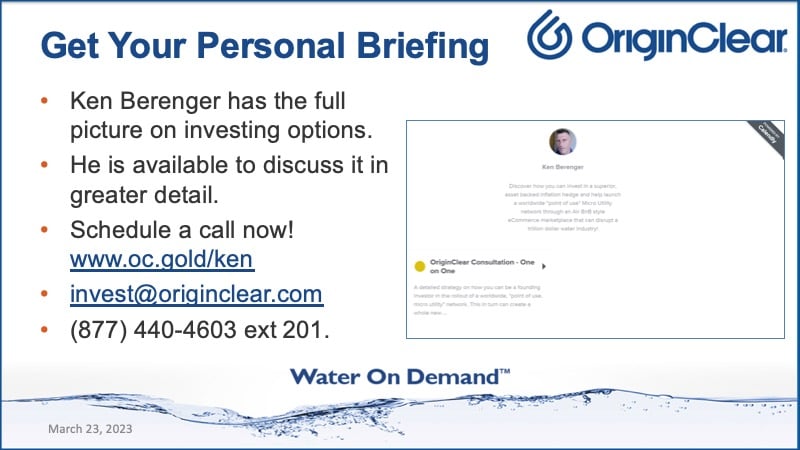
Also want to remind everyone that the crowdfunding preview phase, which is in right now, will expire April 30th. And there's a good reason for it, which I can't get into, but it's a good reason and it's good news. But we have to freeze the crowdfunding for Water On demand because good things are happening in Water On Demand that I can't get into. How was that for being completely cryptic?
Concern Over Water
Ken: Made perfect sense to me. I know exactly what you're talking about now. So one thing I would mention, we previewed the UN Secretary General, right? That's the current Secretary general.
Riggs: No, no. He was the Under Secretary General.
Ken: So the Under Secretary General. Okay. So the Under secretary general's remarks almost sounded like he was pitching Water On Demand. It's amazing right? So he was talking about how to shepherd and how to govern water more, more meticulously and how to deploy technology to accomplish that end. Now, technology when used to the right purpose, I think, I think that's exactly what we'll be able to do.
We have a built in conservation aspect to what we do that wouldn't it be wonderful if the governments of the world got behind us? Here's the point. We built this thing saying we're going to get zero government or NGO help, but we built it so it made sense to the private sector, right? And if you can if you just make sense, then adoption can happen much more rapidly on a global scale. If you know the NGOs and the governments go, wow, that's working without our help, right? Isn't that cool, right?
Riggs: It's a grassroots thing and it works organically because a lot of what governments do is it's, you know, mandated. Mandate, mandate, mandate. And that's not our, it's not, sometimes distorted. Now, I'm all for what they're doing. 49 billion being devoted by the US, which is great but it's obviously going to go to certain agendas and so forth and which is why we stay clear of this stuff, because we find ourselves all of a sudden not having commercial opportunities because something wonderful was being done in Central and the Republic of Central Africa.
Ken: And you're pushing string for ten years, right? You're pushing string for ten years. The point is they're talking about it and they're actually, they've come to this same conclusion Riggs, that you and I did in 2020.
Riggs: Amen to that.
Ken: You know what I mean?
Riggs: Because we're extremely savvy.
Ken: Well, they've been keeping up on what I've been talking about. I agree. You know.
Riggs: They sort of, they say, "You know what's going on over at OriginClear?" Anyway, guys, it's been such a pleasure tonight. We are close to the hour, which I like to keep it at that. Jean Tully, one of our investors, says, "Excellent idea to get Estrella as a spokesperson. Pretty smart and knowledgeable."
Estrella: Oh, thank you, love. It made my night.
Riggs: It was great having you. I hope you're having good meetings in New York.
Estrella: Thank you.
Riggs: We'll be following up with more Good stuff. Robert Baxter, "Wonderful night." And Paul Fletcher said, "What are the long term effects of lead? Tell them it makes your hair fall out."
Estrella: Oh, wow.
Riggs: No, it's my friend Paul. Actually, no, it's, lead is...
Ken: Continuing with the hair jokes I see. It causes major neurological problems, including low birth weight, low IQ. There were children eating lead paint in the cities. You know, in the 60s, it was causing...
Riggs: Developmental problems. Exactly.
Ken: Developmental, right. So it was, it was causing developmental, serious developmental issues.
Estrella: Oh, wow.
Riggs: So that's where we are.
Ken: Paul, ADD I think was the least of it. I think it was causing, you know, low IQs and things like that. Really, really awful stuff.
Riggs: Charles Davanzo, "A great show." All right, everyone, thank you all. Have a great night. It's been great. Again, be there next week for the footage from World Water Day. You'll enjoy. Good night. Thank you Estrella.
Estrella: See you guys next Thursday. Thank you, bye.
Riggs: Bye.
%20250px.png?width=250&height=53&name=OriginClear%20Logo%202019%20(RGB)%20250px.png)



